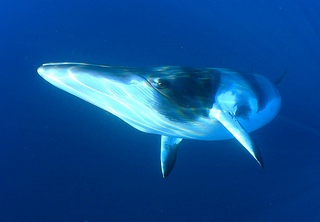-
July 08, 2016
Goodbye and thank you! -
June 16, 2016
Desert dust increases harmful marine bacteria -
June 09, 2016
The greening of Vancouver -
June 03, 2016
Phosphorescent concrete could light the way home -
May 27, 2016
Surfing the polar front: how black carbon reach... -
May 13, 2016
The great Amazon experiment, or, how beer-maker... -
April 29, 2016
Simple ideas for going green now -
April 22, 2016
A very beautiful and unusual animal in danger -
April 08, 2016
The potential of rooftop solar energy: 40% of t... -
April 02, 2016
Fecal fungi may lead to cheaper biofuel -
March 25, 2016
More of everything: increased consumption means... -
March 18, 2016
Vanishing rice paddies and biodiversity loss -
March 04, 2016
Science teachers could be obstacle to climate c... -
February 25, 2016
Understanding climate change skeptics -
February 12, 2016
So you want to make methanol? Start with ruthe... -
January 29, 2016
Greenland ice sheets losing ability to absorb m... -
January 22, 2016
The power of poop: revolutionizing wastewater t... -
January 15, 2016
When good intentions don't mix: designing polic... -
January 08, 2016
Amazon resilience buoyed by diversity -
December 18, 2015
Beyond the headlines: clarifying the connection... -
December 10, 2015
Where fuel goes, water cannot follow: impact of... -
December 02, 2015
The many stories of climate change -
November 25, 2015
Solving the silicon swelling problem in batteries -
November 18, 2015
Making climate change local: how to motivate ci... -
November 11, 2015
Short-term stability and long-term collapse: ex... -
October 29, 2015
Equity or inertia: how emissions sharing philos... -
October 15, 2015
Climate change in the classroom: visualizing gl... -
October 07, 2015
Radiation or human intrusion: which factor is t... -
September 30, 2015
Sequester in numbers: zooplankton migration tra... -
September 18, 2015
Falling to the competition: how climate change ... -
September 09, 2015
Carving a path towards carbon pricing -
September 02, 2015
Saving seeds and genes to save lives -
August 20, 2015
The story of a cave and climate change -
August 05, 2015
Human evolution: the discipline that can save t... -
July 31, 2015
Leave endangered bustards wild – why capt... -
July 22, 2015
Plastic rock: the new anthropogenic marker in t... -
July 09, 2015
Human evolution: the discipline that can save t... -
June 30, 2015
Surface matters: using earth-abundant materials... -
June 24, 2015
Methane-munching microbes limit global warming -
June 17, 2015
Braving the Amazon to understand climate change -
June 03, 2015
Coral's complex resilience to global warming -
May 27, 2015
Back in black: record efficiency for black-sili... -
May 20, 2015
Repeating the history of economic expansion in ... -
May 13, 2015
Commuting Kites - conservation success or urban... -
May 01, 2015
The search for artificial photosynthesis: every... -
April 22, 2015
The road to recovery: a survey of the aftermath... -
April 16, 2015
The organic side of fracking -
April 01, 2015
A matter of scale: the cultural and environment... -
March 27, 2015
eDNA - the next big thing in conservation monit... -
February 25, 2015
The Biofuel Controversy -
February 11, 2015
Out of the frying pan and into the fire? Transl... -
February 04, 2015
How to Keep the Lights On When the Fossil Fuels... -
January 21, 2015
Not All Renewables Are Created Equal -
November 14, 2014
The Green Marketing Façade -
September 14, 2014
Corruption - the greatest obstacle to elephant ... -
August 20, 2014
Unique and Alone On the EDGE of Existence -
August 09, 2014
Detrimental dissent – impacts of uncertai... -
July 25, 2014
Antarctic Tipping Points - the fate of the Amun... -
November 28, 2013
How bats make decisions -
November 22, 2013
Pest pathways and tree disease: How can we save... -
October 25, 2013
Legalising trade in endangered species products... -
September 09, 2013
Plant Pioneers - Assisting The Migration Of Cli... -
August 06, 2013
Citizen Science Takes Flight: Benefits and Chal... -
July 25, 2013
Water World
« Prev « Prev Next » Next »


























I definitely plan to cover the final decision in some way. We'll see what else the case reveals as it progresses...
I hope you keep us abreast of the Hague developments in the coming weeks and months.